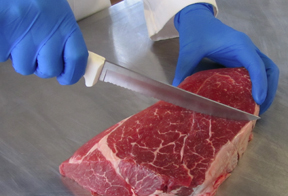2025 Maine Meat Cutting School

A Three-Day Course in Professional Meat Cutting/Processing
February 19-21, 2025
Cost: $500
The Maine New Farmers Project will cover the full cost for any new or beginner farmer (with ten years or less experience). Please email Melissa Libby melissa.libby1@maine.edu or call 207.581.2788 for more information.
The University of Maine Cooperative Extension is working with the Schoolof Food and Agriculture, the Department of Agriculture, Conservation and Forestry, and the University of Kentucky to offer a three-day course in professional meat cutting/processing, with a third day set aside for any spillover and classroom learning objectives. This course includes both classroom and hands-on training.
Dr. Matthew Highlands Pilot Plant, Room 165, Hitchner Hall on the corner of Sebago Road and Portage Road, University of Maine campus, Orono. (Directions)
Jump to: Instructors | Details for Each Day | Topics Covered | Certificate and Micro-Badge
The Maine Meat Cutting School has a limited seating capacity (16) to ensure participants have maximum hands-on learning and without overcrowded classroom space. Anyone interested in professional meat processing, especially young professionals interested in a career in meat cutting/processing. However, this is a tremendous opportunity for livestock producers interested in learning more about meat cutting and processing.
Participants will learn about: History of US meat production, consumer trends, humane handling and slaughter of livestock, meat quality, food safety, and labeling. In addition, participants will have hands-on training with swine cutting, as well as, sausage making. Students will have the opportunity to tour professional/commercial meat processing facilities, and participate in a customized animal composting school.
What is different this year? The University of Maine Dr. Matthew Highlands Pilot Plant was licensed as a custom meat processing facility. This allows us to offer this training to a larger group of participants. We have classroom space on campus to accommodate learning in a much more comfortable environment. Also, the meat cutting room is more spacious so participants will have an easier time interacting with the instructor and each other. However, the greatest benefit is that will be able to source more animals for the hands-on cutting portion of the class so participants will get to cut more animals than in previous cutting schools.
Instructors
Instructors include Dr. Gregg Rentfrow, Professor, and Meat Science Specialist at the University of Kentucky; Dr. Colt Knight, Associate Extension Professor and State Livestock Specialist for the University of Maine Cooperative Extension; and Certified Executive Chef Robert Dumas, Food Science Innovation Coordinator and Facility Manager at the University of Maine.
Details for Each Day
- Wednesday, February 19, 2025, 2:00-5:00 p.m., The group will learn about the history of meat in the United States, meat Inspection, food safety and processing yields.
- Thursday, February 20, 2025, 9:00 a.m.-4:00 p.m., the group will work with Dr. Rentfrow and Chef Dumas to witness a live cutting demo on how to properly break down a pork side into primals, retail cuts, and sausage. Then participants will break down their own pig side in pairs. This includes quartering, creating primal cuts, fabricating retail cuts, making and forming sausage, packaging, and clean-up. Grill up some of the pork cuts!
- Friday, February 21, 2025, 9:00 a.m.-noon, the group will work with the Maine Composting Team for a customized hands-on course detailing how to composting animal carcasses, viscera, and leftovers from meat processing. Composting is an environmentally friendly and sustainable way to manage waste generated from meat processing. Participants of the Meat Cutting School will get instruction from the Maine Compost Team and will learn the basics of compost biology, compost feedstocks, pile management and compost troubleshooting through lectures and hands-on exercises. On the third day, participants will also visit and tour a working Inspected Meat Processing facility.
Participants will also get access to the Virtual Maine Meat Cutting School videos that cover the complete breakdown of Beef, Lamb, and Pork in high-quality 4K video so you won’t have to worry about forgetting what you learned during the in-person training.
Participants will receive a 6″ boning knife.
Everyone who successfully completes this course will receive both a certificate of completion and a digital micro-badge (shareable via email or social media) from the University of Maine/University of Maine System for the Maine Meat Cutting School.
Topics Covered:
- History of Meat and USDA Meat Inspection
- Consumer Trends
- Humane Handling
- Hands-On: Knife Safety; Sanitation/Cleanup
- Meat Quality-Color
- Food Safety and Personal Health
- Common Pathogens in Meats and the Meat Room
- Swabbing Activity
- Meat Quality-Fat/Marbling
- Labeling
- What is HACCP?
- Pork Processing Laboratory
- Meat Quality-Tenderness
- Proper Handling of Animals Before Slaughter and the Proper Process of Killing
- How Much Meat to Expect From Each Species
- Sausage and Processed Meats
- Meat Inspection and Sales
- Touring of Meat Processing Facilities
Directions to Hitchner Hall, UMaine Campus, Orono
Questions? Contact Melissa Babcock at melissa.libby1@maine.edu or 207.581.2788 or 1.800.287.7170 (in Maine)
If you are a person with a disability and need an accommodation to participate in this program, please call Melissa Babcock at 207.581.2788 or 1.800.287.7170 (in Maine) to discuss your needs. Receiving requests from accommodations at least 10 days before the program provides a reasonable amount of time to meet the request, however, all requests will be considered.
In complying with the letter and spirit of applicable laws and pursuing its own goals of diversity, the University of Maine System does not discriminate on the grounds of race, color, religion, sex, sexual orientation, transgender status, gender, gender identity or expression, ethnicity, national origin, citizenship status, familial status, ancestry, age, disability physical or mental, genetic information, or veterans or military status in employment, education, and all other programs and activities. The University provides reasonable accommodations to qualified individuals with disabilities upon request. The following person has been designated to handle inquiries regarding non-discrimination policies: Director of Equal Opportunity, 5713 Chadbourne Hall, Room 412, University of Maine, Orono, ME 04469-5713, 207.581.1226, TTY 711 (Maine Relay System).
